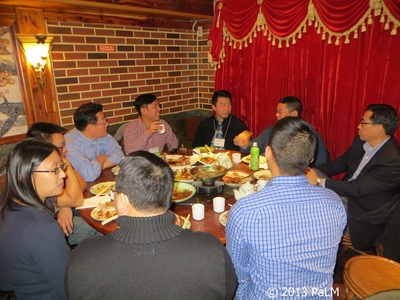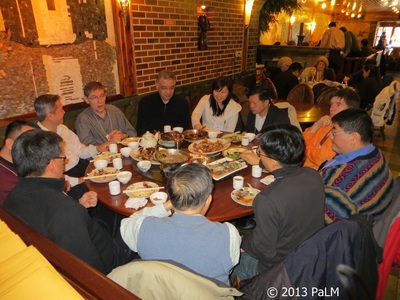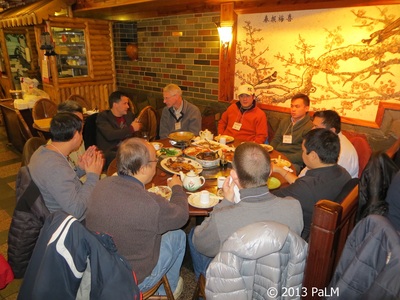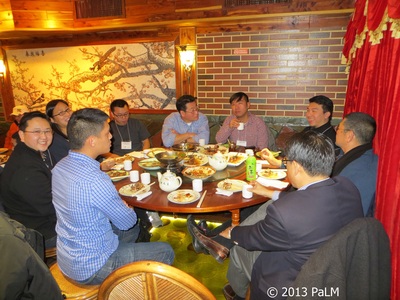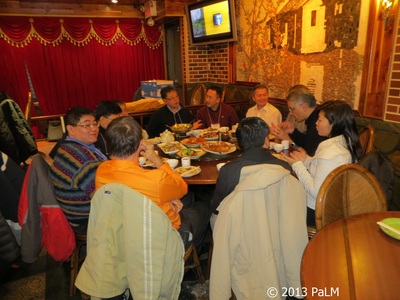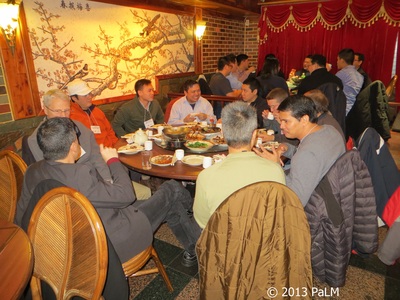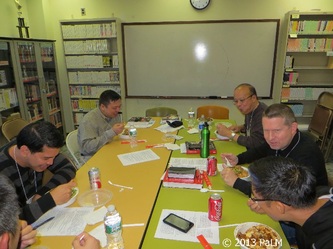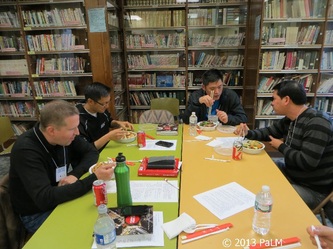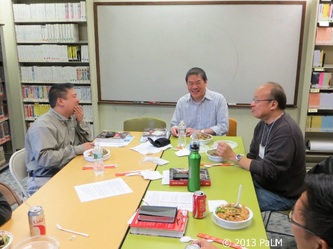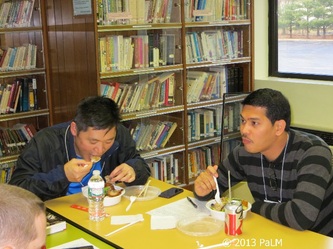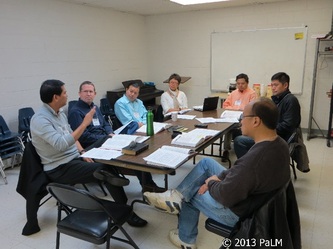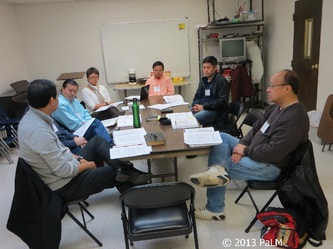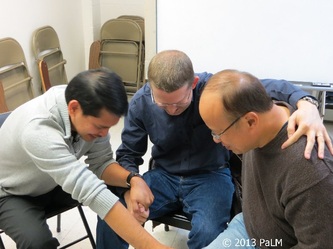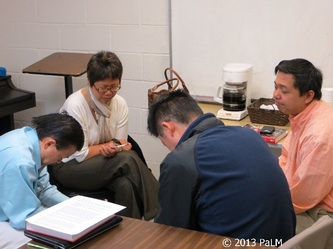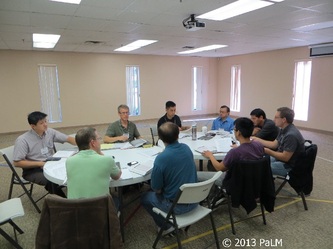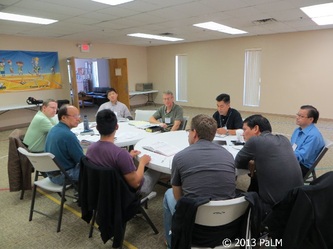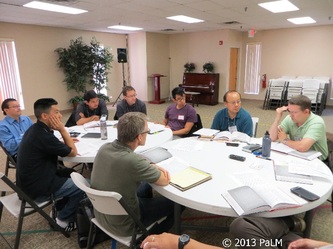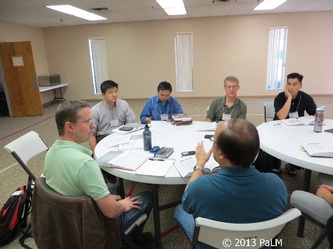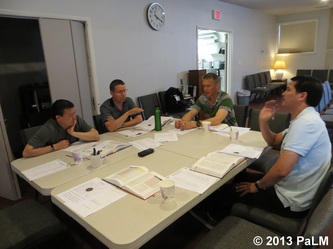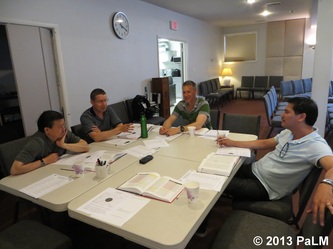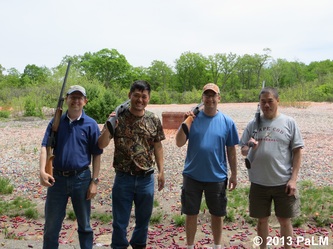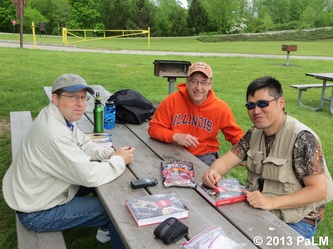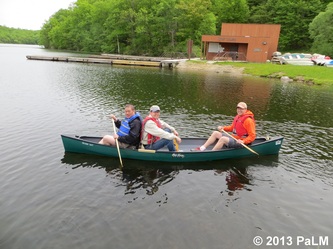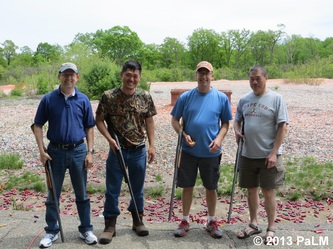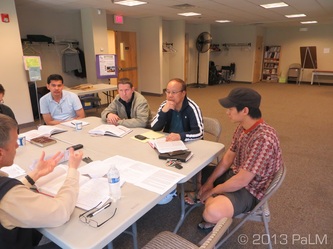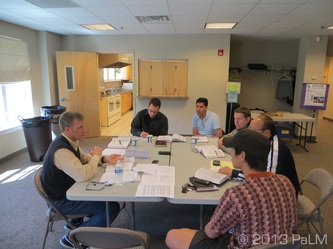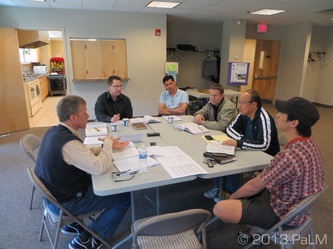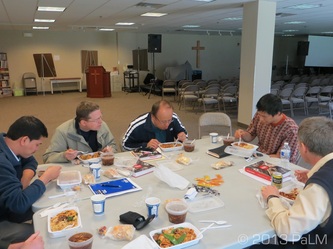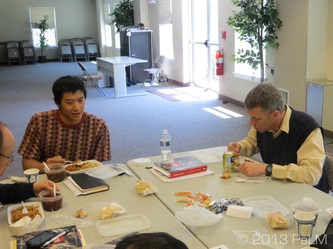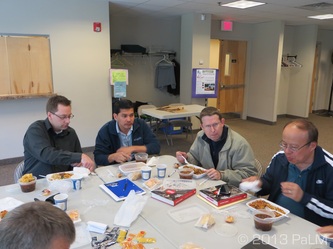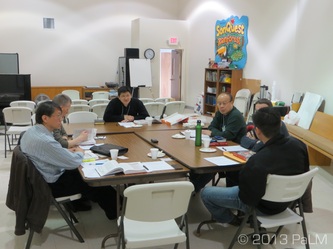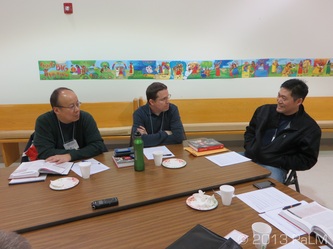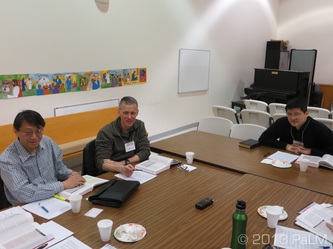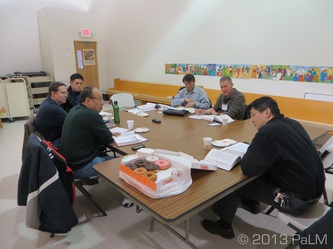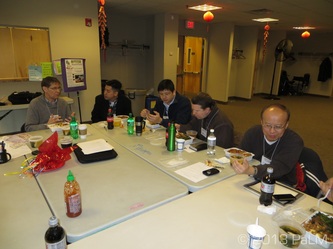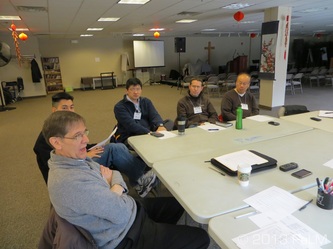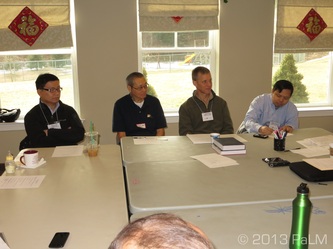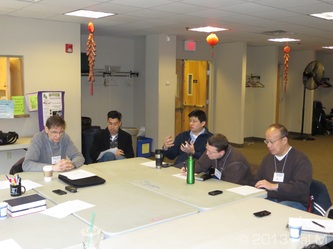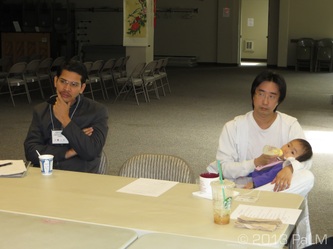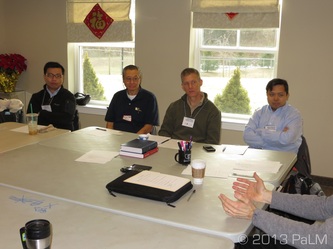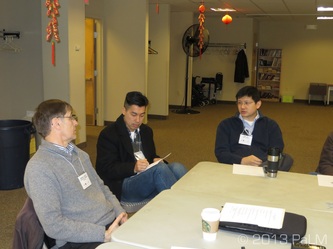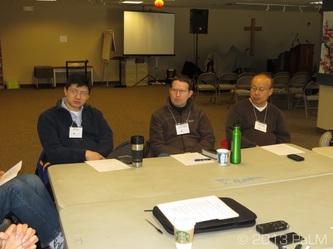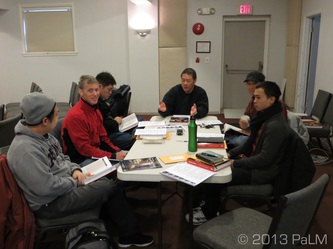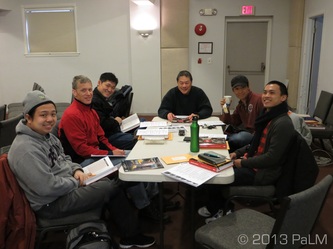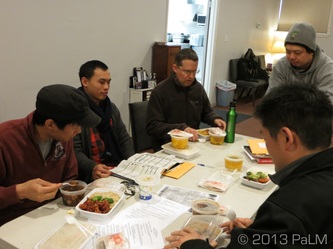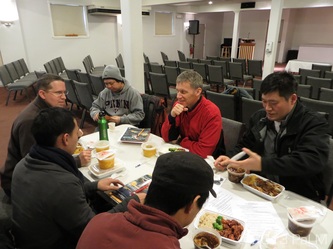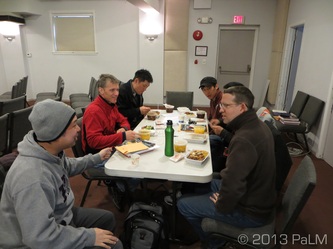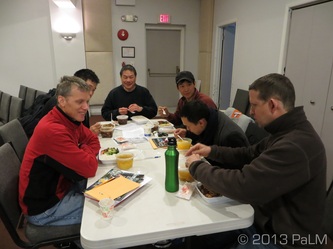20131211 PaLM's Pastors Appreciation Lunch
PaLM hosts an annual Pastor's Christmas Appreciation luncheon as an expression of our appreciation for the work our Pastors did the past year. Generally, this is the only occasion when pastors from New York and New Jersey meet, fellowship and enjoy a meal together.
20131122 New Jersey Co-Worker's Fellowship
Movement Dynamics
The average church member recognizes the fact that a church bears many characteristics of an institution. What many do not realize is that a church must concurrently exhibit “movement dynamics” if it is to be a healthy and growing church. What, one might ask, are movement dynamics? Four traits characterize movement dynamics: vision, sacrificial commitment by all, flexibility to work outside of themselves, and spontaneity. These four traits contrast the traits found in an institutional church: governed by rules and regulations, sacrificial commitment of those “at the top” only, a reluctance to work outside of itself, and a strong desire for durability and stability. Churches that keep their ministry and work in balance between these two extremes are what Keller calls organized organisms.
Keller goes on to point out that organized organisms will not only exhibit movement dynamics within themselves, but they will also exhibit movement dynamics beyond themselves via church planting and the formation of alliances. Organized organisms plant church because it is both biblical and the most effective means of growing God’s kingdom. Furthermore, they seek to form alliances with churches and organizations of different denominations, ethnicities, traditions because they understand and accept the fact that the work is too big and too diverse for any one church or organization to achieve. It is not until “the church” is working together as one that it will accomplish the work God gave it.
As Keller puts it, “changing a city with the gospel takes a movement.” No one pastor, church, or denomination can do it on its own. All must be united and work together for God to transform an entire city.
Keller goes on to point out that organized organisms will not only exhibit movement dynamics within themselves, but they will also exhibit movement dynamics beyond themselves via church planting and the formation of alliances. Organized organisms plant church because it is both biblical and the most effective means of growing God’s kingdom. Furthermore, they seek to form alliances with churches and organizations of different denominations, ethnicities, traditions because they understand and accept the fact that the work is too big and too diverse for any one church or organization to achieve. It is not until “the church” is working together as one that it will accomplish the work God gave it.
As Keller puts it, “changing a city with the gospel takes a movement.” No one pastor, church, or denomination can do it on its own. All must be united and work together for God to transform an entire city.
20131025 New Jersey Co-Worker's Fellowship
Integrative Ministry
A Center Church Ministry Keller tells us involves four fronts: connecting people to God, connecting people to one another, connecting people to the city and connecting people to the culture; all of which must be pursued and kept in balance at the same time. This, needless to say, is a challenge. Most churches focus on one, two or even three of the four, but few are they who pursue all four equally well.
The reason is understandable; no church does everything equally well. Every church has its strengths and weaknesses. Accordingly, the tendency of a church and its leaders is to focus their attention and efforts on what could be done well and overlook what cannot be done well. This, Keller points out, is detrimental; for in failing to make a strong effort to do all four at once equally well will result in the front(s) pursued falling short of its full potential. A church is only able to maximize its efforts in each of the four fronts when the four are equally pursued and balanced.
The reason is understandable; no church does everything equally well. Every church has its strengths and weaknesses. Accordingly, the tendency of a church and its leaders is to focus their attention and efforts on what could be done well and overlook what cannot be done well. This, Keller points out, is detrimental; for in failing to make a strong effort to do all four at once equally well will result in the front(s) pursued falling short of its full potential. A church is only able to maximize its efforts in each of the four fronts when the four are equally pursued and balanced.
20130927 New Jersey Co-Worker's Fellowship
Missional Community
The Christian community
widely adopted the idea of establishing missional churches after a book, entitled
Missional Church, was published in
1998. The book expounded the idea that North American was now a mission field that
God is actively redeeming and challenged the church to partner with, and labor alongside,
of him. A broad and diverse swath of Christendom rose up to accept this
challenge. However, while doing so, each incorporated into the missional concept
its own theology and culture resulting in vastly different, and at times
contradictory ideas, of what constituted a missional church. In an attempt to make
sense of the many and diverse definitions, a professor of missions sorted and categorized
them into four broad streams. From these streams, Keller finds what they all
have in common and suggests their commonalities defines best what a missional
church is from a Center Church context.
In Centering the Missional Church, Keller highlights three dangers today’s missional church must avoid if it is to be an effective: 1) its message is too shallow, 2) its forms are too rigid, and 3) its Gospel definition is too broad. He then offers his readers six traits that should characterize every missional church.
In Equipping People for Missional Living, Keller provides many practical ideas and suggestions for pastors to promote missional living within their churches. The list is worth reading for its many ideas. They will likely inspire any pastor interested in establishing a missional church to come up with his own list to further the missional work of his church.
In Centering the Missional Church, Keller highlights three dangers today’s missional church must avoid if it is to be an effective: 1) its message is too shallow, 2) its forms are too rigid, and 3) its Gospel definition is too broad. He then offers his readers six traits that should characterize every missional church.
In Equipping People for Missional Living, Keller provides many practical ideas and suggestions for pastors to promote missional living within their churches. The list is worth reading for its many ideas. They will likely inspire any pastor interested in establishing a missional church to come up with his own list to further the missional work of his church.
20130621 New Jersey Co-Worker's Fellowship
Cultural Engagement
In 1517 Martin Luther posted his 95 theses on the doors of All Saints’ Church in Wittenberg, Saxony. The posting led eventually to the fragmentation of
the church, dividing it among denominational differences and theological traditions. More recently, a new threat of even greater fragmentation and
deeper divisions has emerged. Since the mid-twentieth century in Europe and the late 1960’s in the United States, the church has struggled mightily with how it should respond to the changing culture around us. Prior to this cultural shift, the public and cultural institutions in the U.S. supported basic Judeo-Christian beliefs (e.g. people generally upheld the same views on homosexuality, abortion, and the morality of sex outside of marriage). Since then, many people now voice an opinion opposite of what was once a culturally accepted norm.
What has been the church’s response to this cultural shift? How could the church better respond to this cultural shift? What changes, if any, must the
church make to adapt to these shifts in cultural? These and many other questions that involve cultural engagement have the potential to further divide an already deeply divided church. Keller provides insights into why our churches have responded as they have to date and offers to his readers a more biblically balanced approach to cultural engagement.
the church, dividing it among denominational differences and theological traditions. More recently, a new threat of even greater fragmentation and
deeper divisions has emerged. Since the mid-twentieth century in Europe and the late 1960’s in the United States, the church has struggled mightily with how it should respond to the changing culture around us. Prior to this cultural shift, the public and cultural institutions in the U.S. supported basic Judeo-Christian beliefs (e.g. people generally upheld the same views on homosexuality, abortion, and the morality of sex outside of marriage). Since then, many people now voice an opinion opposite of what was once a culturally accepted norm.
What has been the church’s response to this cultural shift? How could the church better respond to this cultural shift? What changes, if any, must the
church make to adapt to these shifts in cultural? These and many other questions that involve cultural engagement have the potential to further divide an already deeply divided church. Keller provides insights into why our churches have responded as they have to date and offers to his readers a more biblically balanced approach to cultural engagement.
20130517 New Jersey Co-Worker's Fellowship
City Vision
Today, in the eyes of many Christians, the city is a place of evil and inconsequence. Keller begs to differ in his view of the city. In fact, not only does he disagree with such a view, he declares emphatically, and unequivocally, that the cities of the world need to be the highest priority of the church in the twenty-first century.
The city, from Keller’s perspective, refers not only to the grandiose urban centers of the world (e.g. Shanghai, Moscow or New York City) but also to
smaller communities (e.g. university towns, villages). How is that possible, you ask? Well, that’s because Keller is using a biblical definition of city which is based on population density and not “today’s” definition which is based on population size.
What every city today has in common is the fact that the number of people moving into them is far greater than the number of churches serving them.
By most estimates, Keller tells us, over 50% of the world’s population now live in cities. Unless we Christians plant, establish, and grow more churches,
reaching “the lost within our cities” will become extremely difficult.
Regardless of whether you agree or disagree with Keller, no one can deny that the cities of the world will play a key role in the salvation of mankind in the foreseeable future.
The city, from Keller’s perspective, refers not only to the grandiose urban centers of the world (e.g. Shanghai, Moscow or New York City) but also to
smaller communities (e.g. university towns, villages). How is that possible, you ask? Well, that’s because Keller is using a biblical definition of city which is based on population density and not “today’s” definition which is based on population size.
What every city today has in common is the fact that the number of people moving into them is far greater than the number of churches serving them.
By most estimates, Keller tells us, over 50% of the world’s population now live in cities. Unless we Christians plant, establish, and grow more churches,
reaching “the lost within our cities” will become extremely difficult.
Regardless of whether you agree or disagree with Keller, no one can deny that the cities of the world will play a key role in the salvation of mankind in the foreseeable future.
20130426 New Jersey Co-Worker's Fellowship
Gospel Contextualization
God’s Word makes clear what our role in his plan of salvation is, we are to proclaim the Gospel to the lost. That sounds easy enough, but what we fail to realize is that the message we proclaim is invariably encased in culture. As a result, the moment we open our mouths, we attract some while simultaneously repelling others. Since we live in a multicultural environment, this is to be expected and is normal.
What is tragic about the above scenario is that too often we fail to realize that our culture encrusted message repels some, and in failing to realize that, we never adjust our message so that all may hear.
In Gospel Contextualization, Keller declares without equivocation the necessity to intentionally contextualize our gospel proclamations so that all may hear and have the opportunity to received Christ as Lord and Savior. Contextualization, as Keller defines it, “is giving people the Bible’s answers, which they may not at all want to hear, to questions about life that people in their particular time and place are asking, in language and forms they can comprehend and through appeals and arguments with force they can feel, even if they reject them.” (Center Church, page 89).
While we have obeyed and proclaimed God’s message of salvation to all, we have not been very effective. In Gospel Contextualization, Keller explains how we may effectively proclaim the Gospel. Gospel Contextualization is chock full of insights, observations and illustrations that will help every preacher prepare a better and more effective Gospel Message that in time all will hear.
Discussion Handouts
What is tragic about the above scenario is that too often we fail to realize that our culture encrusted message repels some, and in failing to realize that, we never adjust our message so that all may hear.
In Gospel Contextualization, Keller declares without equivocation the necessity to intentionally contextualize our gospel proclamations so that all may hear and have the opportunity to received Christ as Lord and Savior. Contextualization, as Keller defines it, “is giving people the Bible’s answers, which they may not at all want to hear, to questions about life that people in their particular time and place are asking, in language and forms they can comprehend and through appeals and arguments with force they can feel, even if they reject them.” (Center Church, page 89).
While we have obeyed and proclaimed God’s message of salvation to all, we have not been very effective. In Gospel Contextualization, Keller explains how we may effectively proclaim the Gospel. Gospel Contextualization is chock full of insights, observations and illustrations that will help every preacher prepare a better and more effective Gospel Message that in time all will hear.
Discussion Handouts
20130322 New Jersey Co-Worker's Fellowship
Gospel Renewal
What motivates me as I seek to serve, obey and fulfill our Lord’s every command? It is a question that we all need to ask ourselves several times a day. Instead, the question is, too often, neglected or forgotten.
In the first section of Center Church Keller reminds us that the Gospel is Good News; it is something our Lord did for us when he went to cross and it is something to which we must respond. In section two of Center Church, Keller points out that the Gospel is not only an intellectual concept to be understood, but it is also a truth to be experienced; for the Gospel frees us from the bondage of sin and allows us to act, do, and serve our Lord out of the gratefulness and gratitude of a thankful heart.
What motivates me in my service to our Lord? That is a question we ministers of the Word must ask, not only of ourselves, but also of our congregants each and every time we step into the pulpit. When such a question is honestly evaluated and answered, our heart cannot help but be engaged in the process. When our heart is engaged in evaluating our motives, the Spirit is able to correct or challenge them. And upon accepting the Spirit’s correction, renewal and refreshment follows.
Discussion Outline
In the first section of Center Church Keller reminds us that the Gospel is Good News; it is something our Lord did for us when he went to cross and it is something to which we must respond. In section two of Center Church, Keller points out that the Gospel is not only an intellectual concept to be understood, but it is also a truth to be experienced; for the Gospel frees us from the bondage of sin and allows us to act, do, and serve our Lord out of the gratefulness and gratitude of a thankful heart.
What motivates me in my service to our Lord? That is a question we ministers of the Word must ask, not only of ourselves, but also of our congregants each and every time we step into the pulpit. When such a question is honestly evaluated and answered, our heart cannot help but be engaged in the process. When our heart is engaged in evaluating our motives, the Spirit is able to correct or challenge them. And upon accepting the Spirit’s correction, renewal and refreshment follows.
Discussion Outline
20130222 New Jersey Co-Worker's Fellowship
Wendell Wyatt "Serving for the Long Haul"
In 2012 Wendell Wyatt celebrated his 25th year of service as the English Ministry Pastor of Christian Testimony Church. While 25 years of pastoring the same congregation may fall short of Lee Hearn's tenure at Chinese Evangel Mission Church-Manhattan, it nevertheless is a remarkable and rare achievement that few will attain. In today's session Wendell shares his secrets of "serving for the long haul." Anyone who desires to pastor in an Asian American context, especially in the NY/NJ region, needs to hear what Wendell has to say. You will find your time with Wendell well spent, and the wisdom gained, well worth the time...take a listen and see if you don't agree.
Notes:
1. Lee Hearn, now retired, served as the English Ministry Pastor of Chinese Evangel Mission Church for 39 years (1962-2001).
2. Steve Chin, currently the Senior Pastor of Boston Chinese Evangel Church, celebrated his 35th year of service in 2012.
Due to a technical problem Wendell's 11/2 hour presentation lasts only an hour on our audio file. We regret the incompleteness of his presentation but what has been captured is useful nevertheless. PaLM plans to have Wendell re-present his material in full in February's NJ Co-Worker's meeting. We hope to have a complete presentation of his talk available for pastors at that time.
For pastors and seminarians only: To request an mp3 copy of the NJ and/or NY presentation for your personal use, email me.
Talk Outline
Notes:
1. Lee Hearn, now retired, served as the English Ministry Pastor of Chinese Evangel Mission Church for 39 years (1962-2001).
2. Steve Chin, currently the Senior Pastor of Boston Chinese Evangel Church, celebrated his 35th year of service in 2012.
Due to a technical problem Wendell's 11/2 hour presentation lasts only an hour on our audio file. We regret the incompleteness of his presentation but what has been captured is useful nevertheless. PaLM plans to have Wendell re-present his material in full in February's NJ Co-Worker's meeting. We hope to have a complete presentation of his talk available for pastors at that time.
For pastors and seminarians only: To request an mp3 copy of the NJ and/or NY presentation for your personal use, email me.
Talk Outline
20130125 New Jersey Co-Worker's Fellowship
Gospel Theology
Facilitator: Howard Chan
What is the Gospel?
That was the opening question I asked the New Jersey pastors who came to our January 25, Co-Worker’s meeting. It would be the first of many such questions as they, and their counterparts in New York, meet throughout 2013 to discuss the eight subdivisions of Keller’s latest book Center Church.
One would imagine that answering such a question would be simple but as Keller points out, “Answering this question is a bit more complex than we often assume.”[1] Keller then explains what he means by that and demonstrates in a myriad of ways just how complex the Gospel can be.
And just how complex is the Gospel? Well, if you really want to know, you’ll have to read the book for yourself. I fear I am ill-equipped to summarize in a few paragraphs what took Keller three chapters to say. Better yet, if you’re an Asian American pastor, or a pastor shepherding an Asian American congregation in New York, New Jersey, or its surrounding area, come and join one of our discussion groups. I assure you that the knowledge and wisdom gained from reading and discussing Keller’s book as a group will far surpass the time invested in achieving these endeavors. And that’s on top of the opportunities you have to network and fellowship with other Asian American pastors.
A word about the book itself; the book is an easy read. However, the ideas and concepts Keller presents can, at times, be complex. But, when presenting a complex idea, Keller invariably includes down-to-earth examples and/or illustrations to help the reader better digest what he says. And if the examples and illustrations don’t help, then bring your questions to our group discussion and we’ll look for the answers together.
If you would like to be added to our monthly co-worker’s “invite list,” please send me an email with your name, your title/position, the name of your church, and the group you want to join, New York or New Jersey. Note: While most pastors join the group where they serve, you are free to join whichever group you prefer.
Regrettably, due to a technical problem, no audio recording of this session was made.
Discussion Outline
[1] Timothy J. Keller, Center Church: Doing Balanced, Gospel-Centered Ministry in Your City (Grand Rapids, MI: Zondervan, 2012), 29.
That was the opening question I asked the New Jersey pastors who came to our January 25, Co-Worker’s meeting. It would be the first of many such questions as they, and their counterparts in New York, meet throughout 2013 to discuss the eight subdivisions of Keller’s latest book Center Church.
One would imagine that answering such a question would be simple but as Keller points out, “Answering this question is a bit more complex than we often assume.”[1] Keller then explains what he means by that and demonstrates in a myriad of ways just how complex the Gospel can be.
And just how complex is the Gospel? Well, if you really want to know, you’ll have to read the book for yourself. I fear I am ill-equipped to summarize in a few paragraphs what took Keller three chapters to say. Better yet, if you’re an Asian American pastor, or a pastor shepherding an Asian American congregation in New York, New Jersey, or its surrounding area, come and join one of our discussion groups. I assure you that the knowledge and wisdom gained from reading and discussing Keller’s book as a group will far surpass the time invested in achieving these endeavors. And that’s on top of the opportunities you have to network and fellowship with other Asian American pastors.
A word about the book itself; the book is an easy read. However, the ideas and concepts Keller presents can, at times, be complex. But, when presenting a complex idea, Keller invariably includes down-to-earth examples and/or illustrations to help the reader better digest what he says. And if the examples and illustrations don’t help, then bring your questions to our group discussion and we’ll look for the answers together.
If you would like to be added to our monthly co-worker’s “invite list,” please send me an email with your name, your title/position, the name of your church, and the group you want to join, New York or New Jersey. Note: While most pastors join the group where they serve, you are free to join whichever group you prefer.
Regrettably, due to a technical problem, no audio recording of this session was made.
Discussion Outline
[1] Timothy J. Keller, Center Church: Doing Balanced, Gospel-Centered Ministry in Your City (Grand Rapids, MI: Zondervan, 2012), 29.

